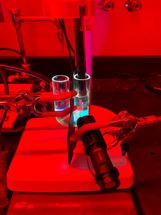GlaxoSmithKline announces Hycamtin® receives positive opinion in Europe for treatment of relapsed small cell lung cancer
GlaxoSmithKline (GSK) announced that HYCAMTIN® (topotecan powder for concentration for solution for infusion) received positive opinion from the European Committee for Human Medicinal Products (CHMP) for the treatment of patients with relapsed small cell lung cancer (SCLC) for whom re-treatment with the first-line regimen is not considered appropriate. HYCAMTIN is the first drug to receive a positive opinion from the CHMP for the treatment of relapsed SCLC. The CHMP's positive opinion will now be proposed for final marketing approval by the European Commission. The product previously received approval in Europefor the treatment of metastatic ovarian cancer after failure of first-line or subsequent therapy.
The positive European opinion was principally based on three key Phase III studies. The first Study (protocol 090) compared the safety and efficacy of HYCAMTIN to the triple combination cyclophosphomide, doxorubicin and vincristine (CAV) in patients with sensitive SCLC. Median overall survival was comparable between the two arms of the study (25.0 versus 24.7 weeks, p = 0.80).
The second Study (protocol 396) compared the safety and efficacy of an oral formulation of topotecan versus IV HYCAMTIN in patients with sensitive SCLC. Median overall survival was comparable between the two arms (33.0 versus 35.0 weeks, Hazard Ratio = 0.98) and both treatments were generally well-tolerated.
The third Study (protocol 478) was conducted to prove the survival benefit of second-line chemotherapy for relapsed SCLC patients. The study was conducted using oral HYCAMTIN plus best supportive care and compared safety and efficacy to best supportive care (BSC) alone. Median overall survival for HYCAMTIN® plus BSC was 25.9 weeks compared to 13.9 weeks for patients who received BSC alone (p = 0.01).
Organizations
Other news from the department research and development

Get the chemical industry in your inbox
By submitting this form you agree that LUMITOS AG will send you the newsletter(s) selected above by email. Your data will not be passed on to third parties. Your data will be stored and processed in accordance with our data protection regulations. LUMITOS may contact you by email for the purpose of advertising or market and opinion surveys. You can revoke your consent at any time without giving reasons to LUMITOS AG, Ernst-Augustin-Str. 2, 12489 Berlin, Germany or by e-mail at revoke@lumitos.com with effect for the future. In addition, each email contains a link to unsubscribe from the corresponding newsletter.



























































